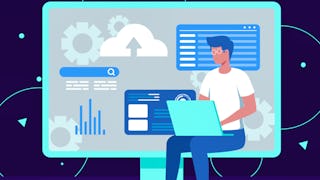Extend Microsoft Power Platform with Seamless Integrations is the third course in the Exam Prep PL-400: Microsoft Certified Power Platform Developer Associate specialization.
This course focuses on integrating Microsoft Dataverse with Azure services. You'll learn to interact with the Dataverse Web API using Postman and call Power Automate Actions via the Web API. We'll cover Azure Service Bus and Event Hubs, and how to write Azure Functions to process Dataverse events. You'll also gain an introduction to Power BI, covering installation, UI, dashboard/report creation, and Quick Insights. The course includes Dynamics 365 administration (app installation, subscription management), and understanding Platform Tenants and Instances. Advanced topics include task flows, mobile management, Power BI Data Modeling, DAX, and ETL concepts, along with data management, visualizations, and data acquisition from diverse sources. The course concludes with a summary and best practices. This course is structured into two modules, each containing Lessons and Video Lectures. Learners will engage with approximately 5:00-6:00 hours of video content, covering both theoretical concepts and hands-on practice. Each module is supplemented with quizzes to assess learners' understanding and reinforce key concepts. Course Modules: Module 1: Enterprise Data Management – Dataverse, APIs, and Power BI Module 2: Optimizing Microsoft Power Platform – From Dynamics 365 to Power BI Minimum 1–2 years of experience in working with Microsoft Power Platform, Dataverse, Dynamics 365, and Power BI is recommended. Candidates with a foundational understanding of Power Platform integrations, data modeling, and business intelligence can take this course to advance their skills and prepare for enterprise-level solutions. By the end of this course, a learner will be able to: - Integrate Dataverse Web API with Azure services like Service Bus, Event Hub, and Azure Functions. - Process Dataverse-triggered events using serverless Azure Functions. - Build and design Power BI dashboards and reports for business insights. - Administer Dynamics 365 environments, tenants, and mobile solutions effectively. - Implement task flows within Dynamics 365 for optimized operations. - Apply Power BI data modeling, DAX, and advanced visualizations for impactful reporting.














